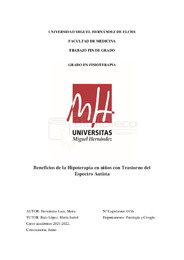Please use this identifier to cite or link to this item:
https://hdl.handle.net/11000/28098Full metadata record
| DC Field | Value | Language |
|---|---|---|
| dc.contributor.advisor | Ruiz López, María Isabel | - |
| dc.contributor.author | Hernández Lara, Marta | - |
| dc.contributor.other | Departamentos de la UMH::Patología y Cirugía | es_ES |
| dc.date.accessioned | 2022-10-27T12:34:47Z | - |
| dc.date.available | 2022-10-27T12:34:47Z | - |
| dc.date.created | 2022-06-20 | - |
| dc.identifier.uri | https://hdl.handle.net/11000/28098 | - |
| dc.description.abstract | Introducción: El Trastorno del Espectro Autista es un trastorno del neurodesarrollo, se estima que en todo el mundo, lo padecen uno de cada cien niños. La hipoterapia es una herramienta terapéutica que produce cambios a nivel cognitivo, social, emocional y motor. Objetivo: Explorar la evidencia sobre los beneficios de la hipoterapia en niños con TEA. Material y métodos: Se realizó una búsqueda bibliográfica en las bases de datos PubMed, Cochrane, Scopus y Embase de artículos publicados entre el año 2011 y 2021. Resultados: Del total de 93 articulos se seleccionaron 8 estudios con un total de 151 participantes con edades comprendidas de los 3 a los 16 años, los cuáles recibían intervenciones de hipoterapia, terapia equino asistida y equitación terapéutica, aportando beneficios a las características más comunes del TEA como trastornos sociales, comunicativos, comportamentales y motores. Conclusión: El tratamiento equino mejora su calidad de vida y reduce las características generales del TEA. Se necesita más investigación en esta área para obtener evidencia concluyente y beneficiar a dichos sujetos con los resultados. | es_ES |
| dc.description.abstract | Introduction: Autism Spectrum Disorder (ASD) is a neurodevelopment disorder, and it is estimated that one out of every one hundred children worldwide suffers from it. Hippotherapy is a therapeutic tool that produces cognitive, social, emotional and motor changes. Objectives: To explore the evidence on the benefits of hippotherapy in children with ASD. Material and methods: A literature search was conducted in PubMed, Cochrane, Scopus and Embase databases for articles published between 2011 and 2021. Results: From the total of 93 articles, 8 studies were selected with a total of 151 participants aged 3 to 16 years, who received hippotherapy, equine-assisted therapy and therapeutic riding interventions, providing benefits to the most common characteristics of ASD such as social, communicative, behavioral and motor disorders. Conclusion: Equine treatment improves their quality of life and reduces the overall features of ASD. More research is needed in this area to obtain conclusive evidence and benefit such subjects with the results. | es_ES |
| dc.format | application/pdf | es_ES |
| dc.format.extent | 29 | es_ES |
| dc.language.iso | spa | es_ES |
| dc.publisher | Universidad Miguel Hernández | es_ES |
| dc.rights | info:eu-repo/semantics/openAccess | es_ES |
| dc.rights | Attribution-NonCommercial-NoDerivatives 4.0 Internacional | * |
| dc.rights.uri | http://creativecommons.org/licenses/by-nc-nd/4.0/ | * |
| dc.subject | Trastorno del espectro autista | es_ES |
| dc.subject | Hipoterapia | es_ES |
| dc.subject.other | CDU::6 - Ciencias aplicadas | es_ES |
| dc.title | Beneficios de la Hipoterapia en niños con Trastorno del Espectro Autista | es_ES |
| dc.type | info:eu-repo/semantics/bachelorThesis | es_ES |

View/Open:
TFG MARTAHERNANDEZLARA.pdf
1,16 MB
Adobe PDF
Share:
.png)
